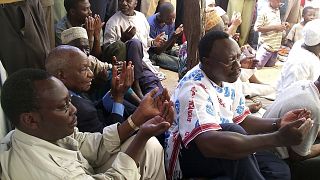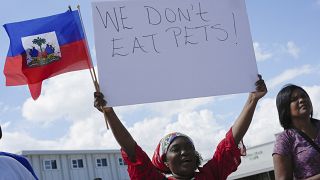Togo
Although Togo reports relatively low numbers of 13,000 confirmed COVID-19 cases and 125 deaths, the West African nation has upheld strict emergency sanitary measures since April last year.
A move that indirectly dealt a blow to its agriculture-dependent economy which relies heavily on cross-frontier trade.
Togo's western and eastern borders are only 50 kilometres apart at its southern tip.
As the country's borders still remain closed, business and exports, as usual, are blocked between several of its neighbours in the region -- such as states like Ghana, Benin and Ivory Coast.
Burkina Faso, Ghana and Benin were among the top five destinations for Togo's exports in 2019, according to the World Trade Organisation (WTO).
Economic growth was estimated at 1.8% for 2020 compared to a forecast of 5.5%, according to official figures.
Emmanuel Sogadji, the president of the Togo Consumers' League, shares the current state of economic affairs as a citizen.
"Public transport costs have gone up, and the prices of basic necessities have gone up, there are difficulties for consumers, for travellers crossing borders, and there are also higher prices in almost all services."
When the global pandemic forced Togo's government to close its land borders, taxi driver Kossigan lost his lucrative business ferrying people across the frontier.
Now like many others who lived off frontier trade, he is still waiting for Togo's borders to reopen while earning his keep as a parking lot attendant.
"Covid-19 has killed off our business. Some of my colleagues got sick by doing nothing, others have returned to their villages," Kossigan said.
"My business is practically dead, I am living a terrible situation since they closed the frontiers as most of my clients come from outside," said Ablavi, 52, a cloth wholesaler in Lome's main market.
In a local market stall, Edith, a cosmetics seller, agreed the situation was critical.
"The authorities really have no pity on us," she said. "Air travel restarted in August, so why are the land borders still closed? It is really unjust."
Céline Goka, a saleswoman at the Lomé Grand Market, feels a stark difference from when the border was open.
"Everyone, Malians, Nigerians, they used to come. Even if we said it was wrong, it was fine. But now everything is on its knees. I've been here since this morning, and I have only sold one loincloth. But I have a family at home to feed."
- All but dead -
In Deckon, a normally bustling commercial centre in the heart of Lome with dozens of boutiques, banks and companies, business owners are just as puzzled.
"I could never have imagined this situation. Everything is almost dead, as most of our clients come from outside. It really is time to reopen the frontier," said Razack, a mobile phone salesman.
Frustrations are growing too for hotel owner Evariste Govi who let go of half of the hotel staff six months ago.
"I really have the impression that the authorities must have their own reasons for this because the number of deaths from coronavirus is far less than those from malaria," Govi said.
"At this pace, I will have to shut the place up by July."
Some business associations and trade organisations in Togo are already alerting government authorities of potential further economic decline if borders are not quickly reopened-
"We have alerted the government several times about the situation in the country. We have to reopen the borders quickly and reduce taxes," added Emmanuel Sogadji.
But perhaps it is not such a simple question of just reopening the borders?
Akodah Ayewouadan, the Minister of Communication and Media and spokesperson for the Government of Togo, shared some insight into how this could possibly unfold.
"Negotiations are underway between the various countries to determine the modalities of this opening and to facilitate this opening. An opening that is perfectly in line with the evolution of the current pandemic."
The World Bank last year said in a report that the combination of closed borders, social distancing measures and restrictions on travel had delivered a heavy blow to Togo's economic activity.
The bank has approved a $70 million credit to help Togo revive its economy -- whose growth activity is forecast to accelerate by 4.8%, as per the Economy and Finance Minister Sani Yaya said in April on public television.
Asked repeatedly about reopening the border, the government has kept to its position.
"The land borders will be reopened when it is necessary," Ihou Wateba, higher education minister who is also in charge of the coronavirus response, told a private radio channel earlier this year.
"Should we reopen the borders for fun or keep the current state of affairs? The situation is under control, that is what is important," said one member of the government's scientific advisory council.
Togolese authorities want to assure the population that the economy has shown itself to be "resilient" in the face of the crisis.












11:07
Botswana's new government races to diversify its economy {Business Africa}
11:07
Benin: Tapping the potential of luxury tourism [Business Africa]
01:28
Putin says BRICS countries will drive economic growth in coming years
Go to video
Zimbabwe to compensate white farmers 20 years after land seizures
11:08
UNGA 2024: Spotlight on Africa's Future {Business Africa}
11:08
Central Bank dispute affects Libya's Oil {Business Africa}